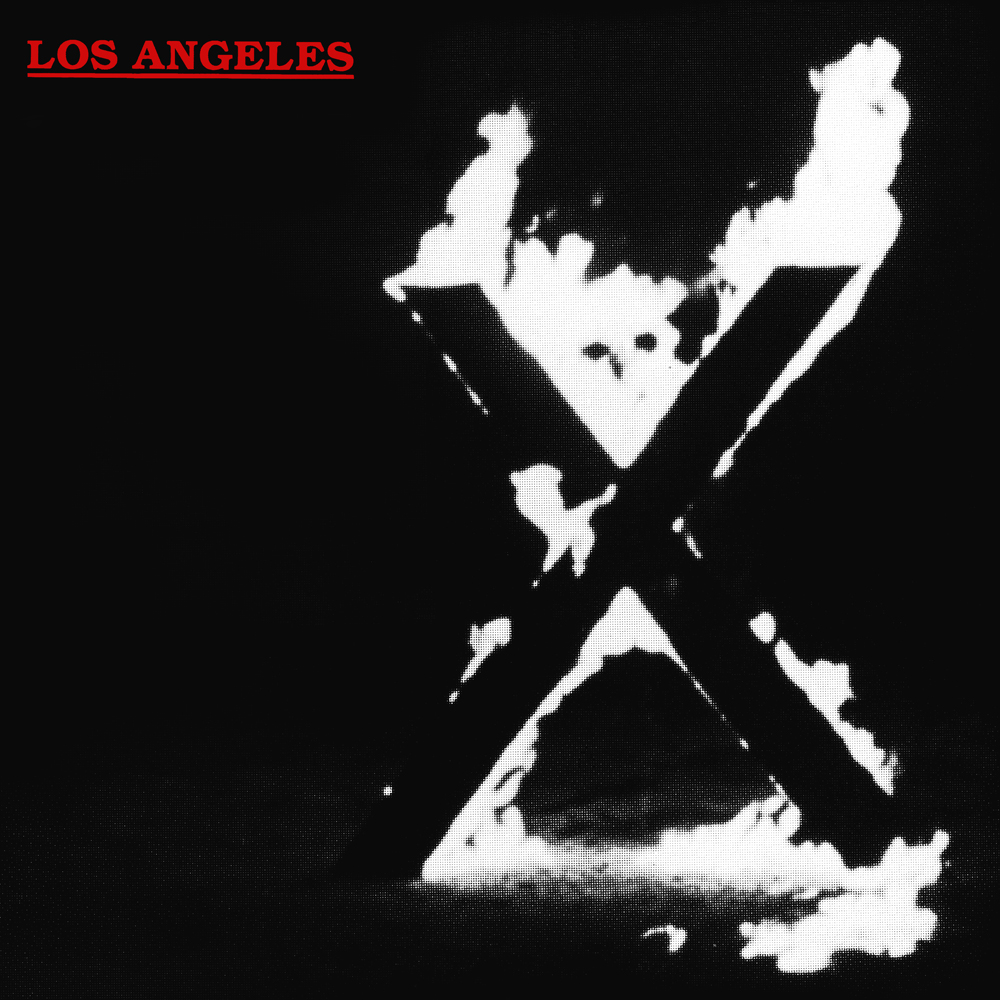Celebrating Exene Cervenka, born on this day in 1956. —Ed.
When it comes to LA punk, nobody played it with such urgency and fuck-you desperation as X. Everybody on the LA punk scene may have been a nihilist, but only X could open a vein and let you see how it felt to bleed, and show you how Hollywood was, in one famous guy’s immortal words, “a tour through a sewer in a glass-bottomed boat.”


They were pissed and not just at society; “The Phone’s Off the Hook, but You’re Not” is strictly personal, as is “The World’s a Mess, It’s in My Kiss.” And thanks to the production and contributions on organ of ex-Doors keyboardist Ray Manzarek, they even had a wider palate than their cohorts on the scene, at least on their debut 1980 LP, the great Los Angeles—a title that let everybody else know X was putting dibs on the city of motels, money, murder, and madness, to quote the Lizard King who once ruled the Hollywood scene.
Los Angeles is frequently an ugly album, coupling as it does unremittingly catchy melodies with lyrics that unflinchingly explore the dark underbelly of the City of Damned Angels. With the exception of their wonderfully speeded-up take on The Doors’ “Soul Kitchen,” on which Cervenka and Doe sing in demented synch, and “The Unheard Music,” a screed about the radio punk blacklist (“Some smooth chords on the car radio/No hard chords on the radio”), Los Angeles is a non-stop sleazefest.
“Johnny Hit and Run Paulene” is a sordid tale, one of the most sordid you’ll ever hear anywhere, about a meth addict and serial rapist and his savaged victims. The song is Chuck Berry on crystal meth, and Doe is unflinching in his depiction of the perp’s victims: “When he was waking up/Beside the bed/He found clumps of hair/The last Paulene wouldn’t cooperate/She wasn’t what you call living really/She was still awake.” If you can show me a more emotionally wrenching set of lyrics, well, I’m not sure I want to see them. Then there’s the “pain of masochism is better than not feeling anything at all” trope of “Sex and Dying in High Society,” a song which could be The Eagles’ “Lying Eyes” (speeded up 1,000 times) until X gets to the part where, “And now you tell the maid/To burn you on your virgin back/With a curling iron/Hotter than hot.””
“Your Phone’s Off the Hook, but You’re Not” has it all—a catchy lyric, frenetic momentum, and lots of rage. Cervenka is a force of nature, Zoom’s guitar zooms, and Doe knows just when to jump in on vocals. “The World’s a Mess, It’s in My Kiss” keeps the frenetic pace but doesn’t have that snarling edge of existential horror; what it does have is Manzarek on organ, who is great, and who does what no punk rocker is supposed to ever do, namely play a long, very cool solo. Manzarek also throws in on the slow and pounding “Nausea,” which I’ve never fallen in love with. Cervenka barks out the lyrics in a staccato rhythm, Zoom plays power chords, and Manzarek is in stellar form, just as he is on “The Unheard Music,” a haunting slow blues about being “locked out of the public eye,” a theme which X would explore more poignantly on 1983’s “I Must Not Think Bad Thoughts.” Meanwhile Zoom’s guitar snarls, and Cervenka and Doe sing most of it in a hush that belies their rage.
The title track is a rip-roaring song with lyrics about a jaded woman who “had to get out” of Los Angeles. “It felt sad,” sing Cervenka and Doe, over and over, while Zoom plays and plays. As for “Sugarlight,” it’s a totally hyped-up tune about junkies. Zoom plays a cranked-up solo, Doe and Cervenka are at their dueting best, and the lyrics are haunting; “Sugarlight, sugarlight/I can’t believe/Swallowing one bulb after another/In the city of electric light.” If that’s not surrealistic enough for you, there’s this: “We sharpen up our teeth/White Sugar he speaks French/Memorizing torsos/He’s open throated.”
X followed Los Angeles with three more brilliant albums, a run that very few bands can lay claim to. As for Los Angeles, it’s a dark and sordid masterpiece about a town ruled by amorality and wanton depravity, but its makers, unlike their compatriot Darby Crash, refused to succumb to the dead ends their music so magically evokes. No, they were survivors, desperate but telling us to get used to it. It took everybody else a long time to catch up to X, but in the meantime they took all the bruises the world that refused to hear them had to offer, and sang, as Dylan Thomas wrote, in their “chains like the sea.”
GRADED ON A CURVE:
A
